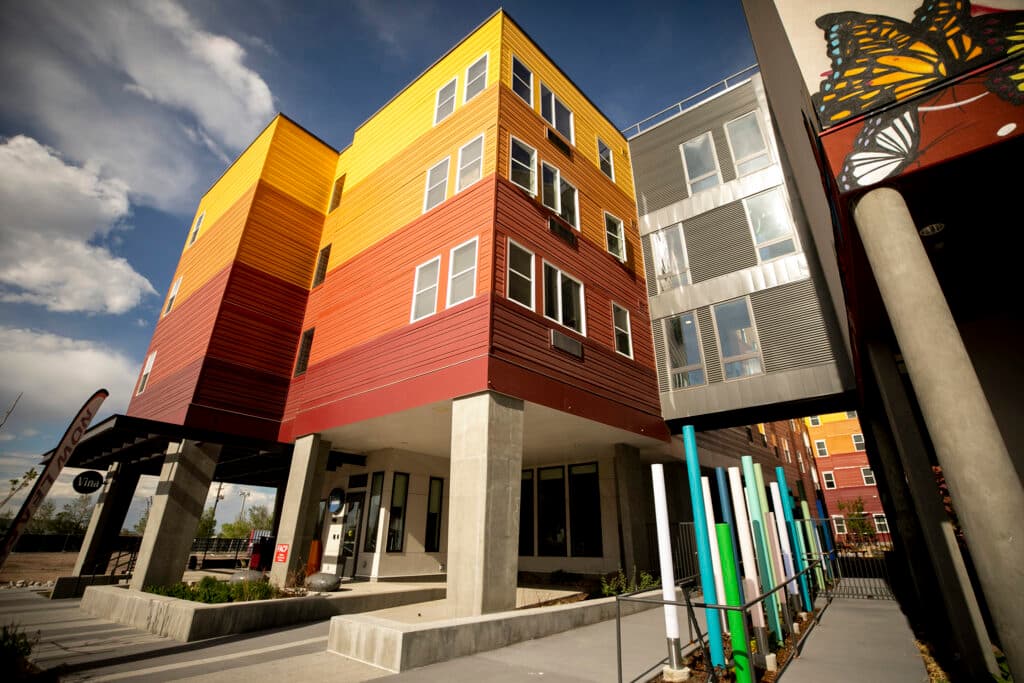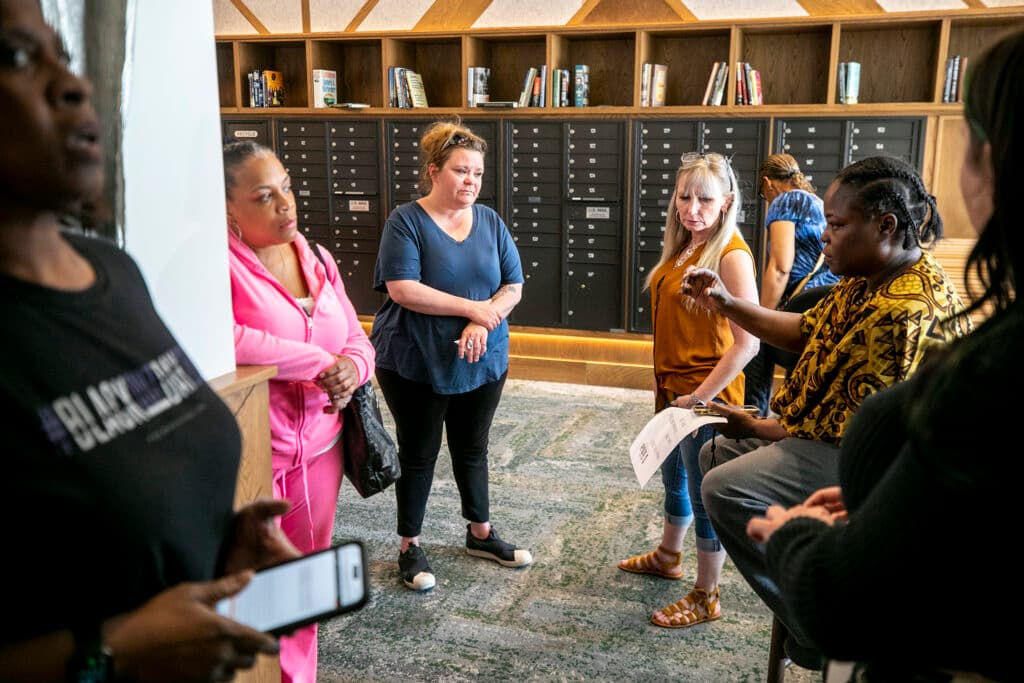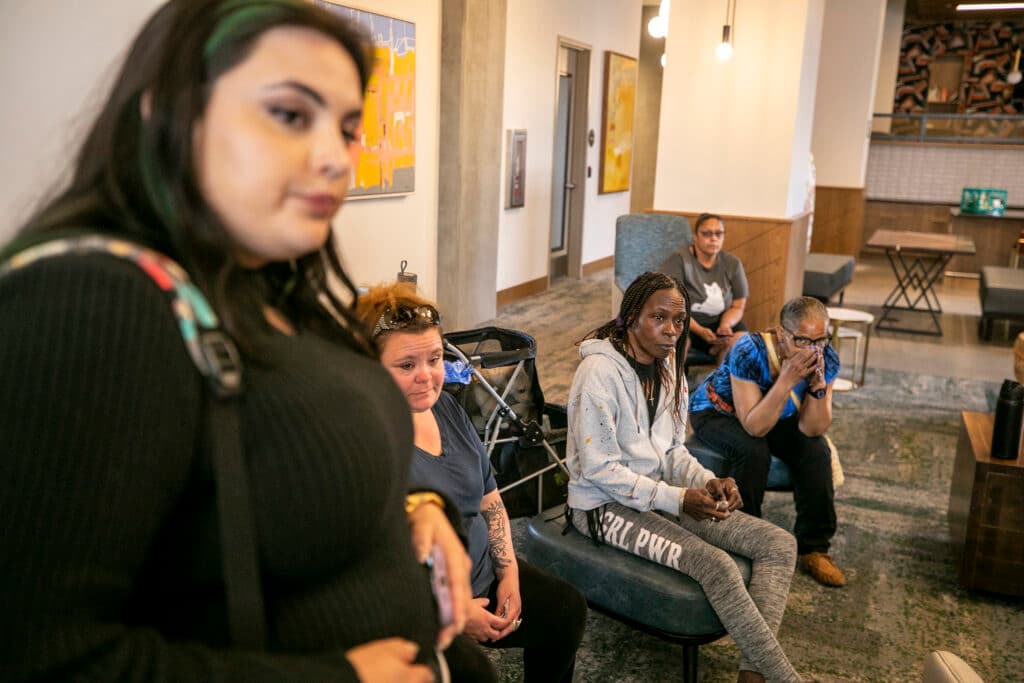Residents of Elyria Swansea’s Viña apartment building are suing their landlord, alleging Columbia Ventures LLC retaliated after tenants attempted to organize for improvements in the affordable building.
Columbia opened the 150-unit building in 2022 at 48th Avenue and Gaylord Street. About half the apartments were subsidized for tenants who make between 30 and 50 percent of the area median income.
A year later, some residents began to complain that broken amenities were not being fixed, rent was sometimes being charged twice and fees attached to payments were not explained clearly. They organized a tenants union and delivered a list of demands to building managers in 2023.
The lawsuit, filed last month, alleges that managers threatened to evict Jessica Owens-Neckien, a leader of the organizing effort, for her advocacy.

The complaint says managers served her with a “Demand for Compliance” letter in September alleging “she had violated the lease by engaging in protected organizing activities including door knocking and approaching other residents in common areas for surveys and statements.”
“The Demand for Compliance was issued for the sole purpose of retaliating against Owens-Neckien for her organizing efforts at the community,” the lawsuit reads. “Issuance of the Demand caused Owens-Neckien to fear that she may be evicted, and quelled her ability to speak with fellow tenants or bring appropriate, good-faith complaints to Defendants.”
The building’s owners say they’re preparing a response.
Dillon Baynes, a managing partner with Columbia Ventures, said his firm plans to respond in court in the next few weeks.
While he couldn’t speak to specific allegations, he said his company does not have a policy against organizing.
“They are absolutely welcome to form organizations as they see fit,” he told us.
That could be a pickleball group or a book club — or a tenants union. But door knocking, he added, could break the rules if it becomes annoying or crosses into harassment.
“We expect them to be fully lawful. What we can’t do — everyone inside the building has a right to the quiet enjoyment of the space,” he said.
The case may center on whether Columbia was protecting other residents from disturbances, or if they were suppressing organizing and complaints.

Cameron Netherland, an attorney with Justice for the People Legal Center who filed the complaint, said his firm is seeking class-action status. That would allow more residents, including those living in other Columbia properties, to file complaints about lease terms that say residents cannot “annoy or disturb others,” “disrupt or interfere with our business operations” or “injure our reputation by making bad faith allegations against us.”
“If they are using this ‘no soliciting’ provision in a way that jeopardizes organizing activity, that's something that does affect everyone in any Columbia Ventures property,” Netherland said.
Columbia Ventures is based in Atlanta and entered the Colorado market with the Viña project, which cost $57 million and received support from affordable housing tax credits and tax exempt bonds, according to its website. The building was honored in 2022 in the Mayor’s Design Awards.
Residents are also unhappy about rising prices.
When Owens-Neckien and other tenants delivered demands to Viña management in 2023, they also brought complaints that rents in the building jumped by 12 percent one year after it opened.
Rent limits for the building’s affordable units are tied to the area median income, or AMI, which means they fluctuate with larger economic changes. Baynes said Columbia adheres to annually updated guidance from the U.S. Department of Housing and Urban Development on rent prices in its buildings.
Still, the price hike was an unwelcome surprise for some Viña residents.
“They upped my rent from $650 to $790,” Dawn Richardson told us. “I felt like I was duped.”
While Richardson conceded it was a misunderstanding that led to her surprise, knowing that didn’t diminish her frustration. The city’s AMI rose, but her income didn’t. She had previously fallen into homelessness before she moved into Viña; the stability she felt when she moved in evaporated when the rent ratcheted up.
“If I stay where I’m at now, and they keep upping the rent, I’m going to end up homeless again,” she said.
Alfonso Espino, a community organizer who helped Owens-Neckien and Richardson create their tenants union, said the rising rent reveals broader concerns about subsidized housing.
“It bakes into the model, this idea that it’s not permanently affordable,” he said, “which doesn’t reflect the needs.”

That creates a baseline of frustration, Espino added, which fuels additional anger when issues about building management arise. It’s one reason he’s hoping more tenants will organize; Viña isn’t the only community that he’s helped to organize.
In contrast, Baynes warned lawsuits like this might have a chilling effect on developers that might otherwise pursue affordable projects in the city.
“There are a very small number of people who do affordable housing,” he said. “This doesn’t increase the numbers of developers who are trying to create affordable housing.”
Espino said that shortage of interested investors is part of the problematic power dynamic that Viña lawsuit plaintiffs are attempting to address.
“It’s like holding communities for ransom. Either you let us be s***** landlords or you get nothing,” he told us. “The reason why it’s important, why we should stand up to retaliation here, is it sends a message to other landlords and tenants here and across the city.”
Unless the parties settle before the lawsuit makes it to court, the plaintiffs in this case will next try to win class-action status to pull more people into the process.
They’re asking a Denver County judge to affirm that door-knocking and organizing is allowed under Columbia’s lease; they’re also asking the court to force Columbia to pay for their legal fees and award Owens-Neckien with monetary damages.












